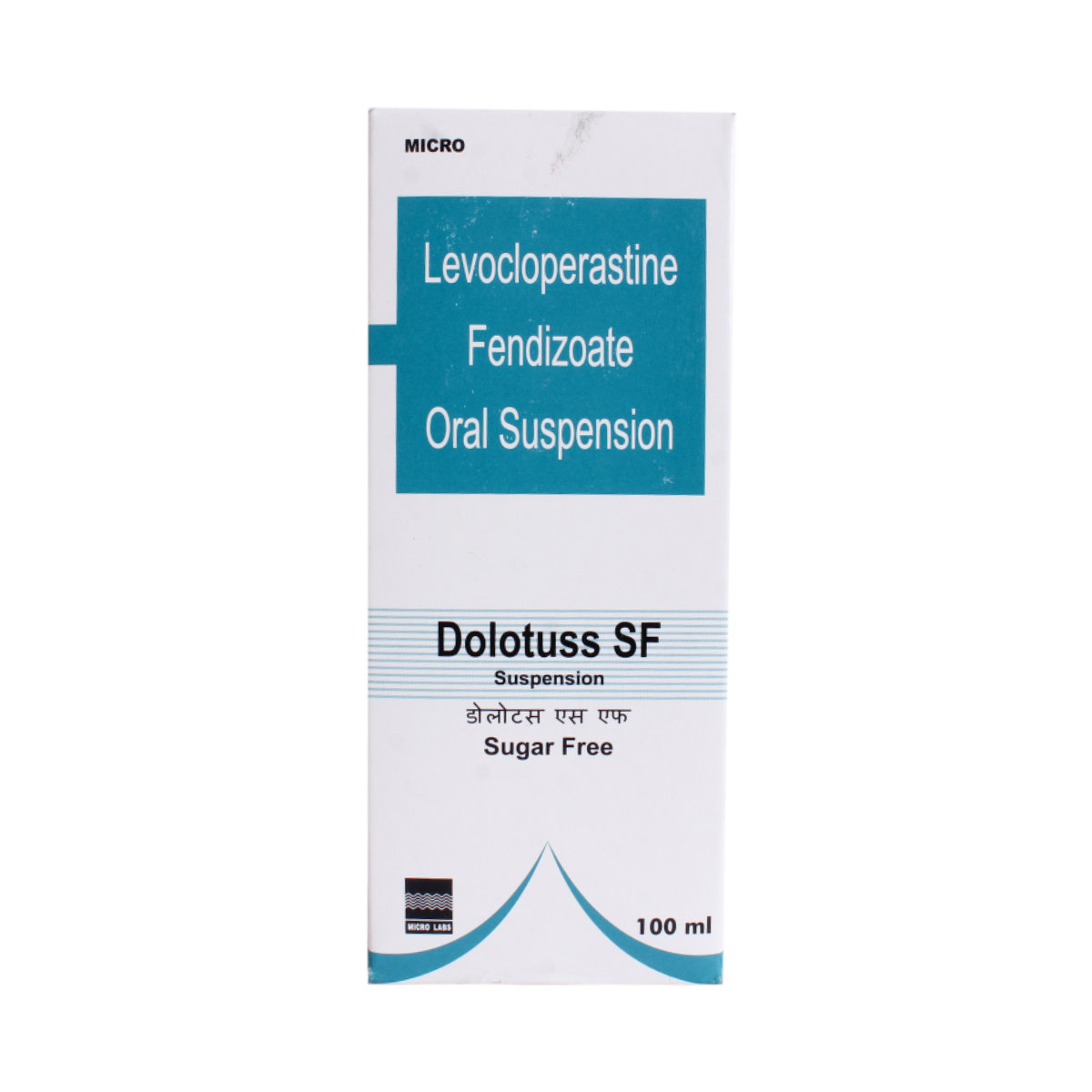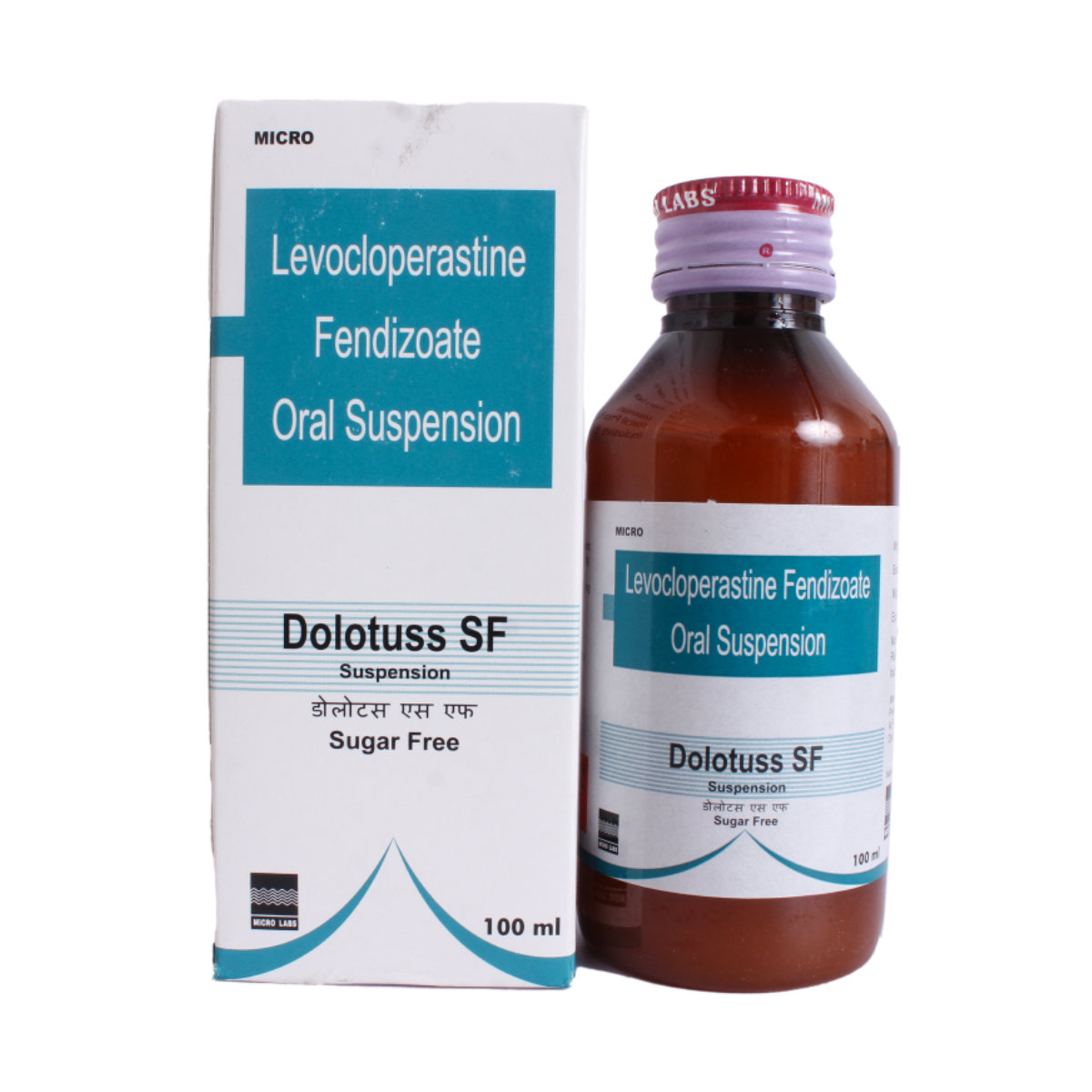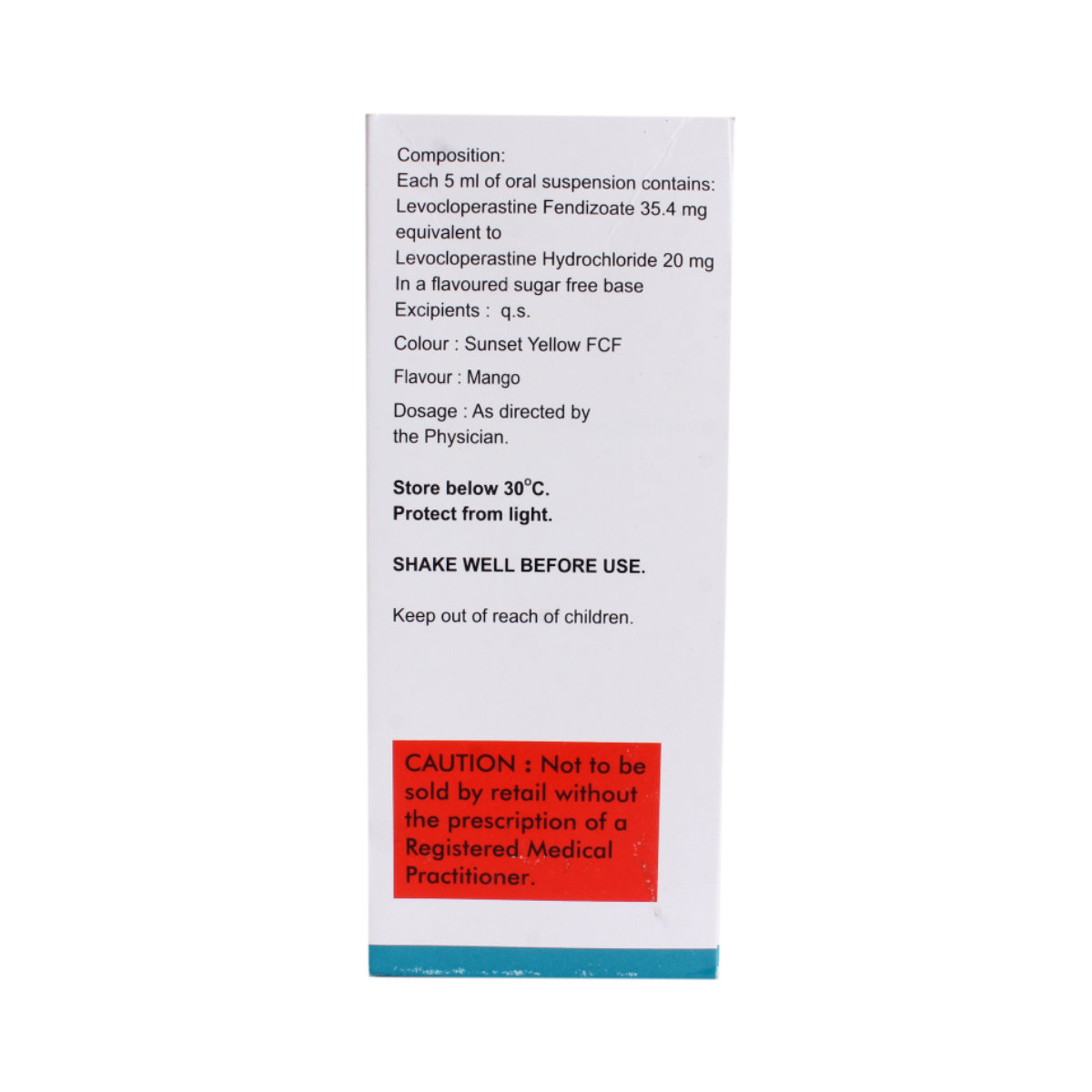Dolotuss SF Oral Suspension 100 ml








MRP ₹125.5
(Inclusive of all Taxes)
₹18.8 Cashback (15%)
Provide Delivery Location
Online payment accepted
 Prescription drug
Prescription drugWhats That
Composition :
Manufacturer/Marketer :
Consume Type :
Expires on or after :
Return Policy :
About Dolotuss SF Oral Suspension
Dolotuss SF Oral Suspension contains an anti-tussive (relieve cough) medication primarily used to treat dry cough. A cough is a reflex action that helps to clear any foreign irritant or mucus in the throat. Mostly cough lasts for a short time (two to three weeks), so it is acute. But sometimes, if it is persistent for more than eight weeks which can lead to chronic cough. Dry cough refers to cough where there is no mucus or secretion along with cough.
Dolotuss SF Oral Suspension contains levocloperastine fendizoate, which is a cough suppressant. It works by blocking the cough receptor present in the brain, which is known to cause cough. Dolotuss SF Oral Suspension is generally prescribed for short term treatment of dry cough. It is also used to treat chronic cough or coughs caused due to smoking, emphysema and asthma.
Take Dolotuss SF Oral Suspension as prescribed by your doctor. You are advised to take Dolotuss SF Oral Suspension for as long as your doctor has prescribed it for you depending on your medical conditions. You may experience nausea, drowsiness, palpitations (racing or skipping heartbeat), dryness in the mouth, dizziness, fainting, headache, fatigue, loss of appetite (not feeling hungry), hydrodipsomania (periodic episodes of uncontrollable thirst), sleepiness. Most of these side effects of Dolotuss SF Oral Suspension do not require medical attention and gradually resolve over time. However, if the side effects persist or worsen, please consult your doctor.
If you are known to be allergic to Dolotuss SF Oral Suspension or any other medicines, please tell your doctor. Dolotuss SF Oral Suspension should not be taken in the conditions like high blood pressure and diabetes mellitus. Increase the intake of fluids so that the mucus present loosens and the throat remains lubricated. Before taking Dolotuss SF Oral Suspension mention all the OTC medicines you are talking to your doctor. If you are pregnant or breastfeeding, please inform your doctor before starting Dolotuss SF Oral Suspension . Dolotuss SF Oral Suspension should not be used in children below 2 years of age as safety and efficacy have not established. Dolotuss SF Oral Suspension may cause drowsiness, sleepiness and dizziness it is advisable to you do not drive unless you are alert.
Uses of Dolotuss SF Oral Suspension
Directions for Use
Key Benefits
Dolotuss SF Oral Suspension is primarily used to treat dry cough. Dolotuss SF Oral Suspension contains ‘levocloperastine fendizoate’, which is a cough suppressant. It works by blocking the cough receptor present in the brain, which is known to cause cough. Dolotuss SF Oral Suspension is generally prescribed for short term treatment of dry cough. It is also used to treat chronic cough or cough caused due to smoking, emphysema and asthma.
Storage
- Inform your doctor about dizziness symptoms. They may adjust your medication regimen or prescribe additional medications to manage symptoms.
- Follow your doctor's instructions for taking medication, and take it at the same time every day to minimize dizziness.
- When standing up, do so slowly and carefully to avoid sudden dizziness.
- Avoid making sudden movements, such as turning or bending quickly, which can exacerbate dizziness.
- Drink plenty of water throughout the day to stay hydrated and help alleviate dizziness symptoms.
- If you're feeling dizzy, sit or lie down and rest until the dizziness passes.
- Track when dizziness occurs and any factors that may trigger it, and share this information with your doctor to help manage symptoms.
- Hydrate your body: Drink enough water to prevent dehydration and headaches.
- Calm Your Mind: Deep breathing and meditation can help you relax and relieve stress.
- Rest and Recharge: Sleep for 7-8 hours to reduce headache triggers.
- Take rest: lie down in a quiet, dark environment.
- Cold or warm compresses can help reduce tension.
- Stay Upright: Maintain good posture to keep symptoms from getting worse.
- To treat headaches naturally, try acupuncture or massage therapy.
- Over-the-counter pain relievers include acetaminophen and ibuprofen.
- Prescription Assistance: Speak with your doctor about more substantial drug alternatives.
- Severe Headaches: Seek emergency medical assistance for sudden, severe headaches.
- Frequent Headaches: If you get reoccurring headaches, consult your doctor.
- Headaches with Symptoms: Seek medical attention if your headaches include fever, disorientation, or weakness.
- Inform your doctor about the nausea and discuss possible alternatives to the medication or adjustments to the dosage.
- Divide your daily food intake into smaller, more frequent meals to reduce nausea.
- Opt for bland, easily digestible foods like crackers, toast, plain rice, bananas, and applesauce.
- Avoid certain foods that can trigger nausea, such as fatty, greasy, spicy, and smelly foods.
- Drink plenty of fluids, such as water, clear broth, or electrolyte-rich beverages like coconut water or sports drinks.
- Use ginger (tea, ale, or candies) to help relieve nausea.
- Get adequate rest and also avoid strenuous activities that can worsen nausea.
- Talk to your doctor about taking anti-nausea medication if your nausea is severe.
- Record when your nausea occurs, what triggers it, and what provides relief to help you identify patterns and manage your symptoms more effectively.
- Preventing Vomiting (Before it Happens)
- Take medication exactly as prescribed by your doctor. This can help minimize side effects, including vomiting.
- Having a small meal before taking your medication can help reduce nausea and vomiting.
- Talk to your doctor about taking anti-nausea medication along with your prescribed medication.
- Managing Vomiting (If it Happens)
- Try taking ginger in the form of tea, ale, or candy to help alleviate nausea and vomiting.
- What to Do if Vomiting Persists
- Consult your doctor if vomiting continues or worsens, consult the doctor for guidance on adjusting your medication or additional treatment.
- Inform Your Doctor: Notify your doctor immediately about your diarrhoea symptoms. This allows them to adjust your medication or provide guidance on managing side effects.
- Stay Hydrated: Drink plenty of fluids to replace lost water and electrolytes. Choose water, clear broth, and electrolyte-rich drinks. Avoid carbonated or caffeinated beverages to effectively rehydrate your body.
- Follow a Bland Diet: Eat easy-to-digest foods to help firm up your stool and settle your stomach. Try incorporating bananas, rice, applesauce, toast, plain crackers, and boiled vegetables into your diet.
- Avoid Trigger Foods: Steer clear of foods that can worsen diarrhoea, such as spicy, fatty, or greasy foods, high-fibre foods, and dairy products (especially if you're lactose intolerant).
- Practice Good Hygiene: Maintain good hygiene to prevent the spread of infection. To stay healthy, wash your hands frequently, clean and disinfect surfaces regularly, and avoid exchanging personal belongings with others.
- Take Anti-Diarrheal Medications: If your doctor advises, anti-diarrheal medications such as loperamide might help manage diarrhoea symptoms. Always follow your doctor's directions.
- Keep track of your diarrhoea symptoms. If they don't get better or worse or are accompanied by severe stomach pain, blood, or dehydration signs (like extreme thirst or dark urine), seek medical help.
Drug Warnings
Do not take Dolotuss SF Oral Suspension if you are allergic to Dolotuss SF Oral Suspension or any ingredients of Dolotuss SF Oral Suspension . Increase the intake of fluids so that the mucus present loosens and the throat remains lubricated. Also, mention all the OTC medicines you are talking to your doctor before taking Dolotuss SF Oral Suspension . Dolotuss SF Oral Suspension should not be taken in the conditions like high blood pressure, thyroid disease, kidney, liver, heart disease and diabetes mellitus. Dolotuss SF Oral Suspension should not be stopped abruptly as it might lead to withdrawal symptoms like irritability, anxiety, diarrhea, restlessness, increased blood pressure. If your condition does not improve or your cough comes back or occurs with fever, rash, please visit the doctor immediately as this could be serious. You must tell your doctor if symptoms do not get better within 7 days of the treatment. Do not smoke as it might worsen your symptoms, so avoid tobacco intake. If you are pregnant or breastfeeding, please inform your doctor before starting Dolotuss SF Oral Suspension . Dolotuss SF Oral Suspension should not be used in children below 2 years of age as safety and efficacy have not established. Dolotuss SF Oral Suspension may cause drowsiness, sleepiness and dizziness it is advisable to you do not drive unless you are alert.
Drug-Drug Interactions
Drug-Drug Interactions
Login/Sign Up
Drug-Food Interactions
Drug-Food Interactions
Login/Sign Up
Diet & Lifestyle Advise
- Wash your hands with soap and water regularly to prevent the spread of germs.
- Eat plenty of foods rich in good bacteria like yogurt to improve overall health.
- Drink plenty of fluids to avoid dehydration.
- Gargle with salt water for relief from sore throat.
- Do not smoke as it might worsen your symptoms, so avoid tobacco intake.
- Avoid alcohol consumption with Dolotuss SF Oral Suspension as it may cause tiredness, drowsiness or lack of concentration.
Side Effects of Dolotuss SF Oral Suspension
- Nausea
- Drowsiness
- Palpitations (racing or skipping heartbeat)
- Dryness in mouth, dizziness
- Fainting
- Headache
- Fatigue
- Loss of appetite (not feeling hungry)
- Hydrodipsomania (periodic episodes of uncontrollable thirst)
- Sleepiness
Habit Forming
Therapeutic Class
All Substitutes & Brand Comparisons
Drug-Diseases Interactions
Drug-Diseases Interactions
Login/Sign Up
FAQs
Dolotuss SF Oral Suspension is primarily used to treat dry cough. Dolotuss SF Oral Suspension contains levocloperastine fendizoate , which is a cough suppressant. It works by blocking the cough receptor present in the brain, which is known to cause cough. Dolotuss SF Oral Suspension is generally prescribed for short term treatment of dry cough. It is also used to treat chronic cough or coughs caused due to smoking, emphysema and asthma.
No, Dolotuss SF Oral Suspension should not be stopped abruptly without consulting your doctor as it might lead to withdrawal symptoms like irritability, anxiety, diarrhoea, restlessness, increased blood pressure. So, please consult your doctor and he might lower your dose gradually depending upon your condition.
Yes, Dolotuss SF Oral Suspension may cause drowsiness, so operating any machinery or driving a car, doing an activity that requires concentration and alertness should be avoided.
Yes, dry coughs frequently are caused by allergies. Cough-modified asthma and upper airway cough syndrome are syndromes linked with certain allergies. Gastroesophageal reflux disease (GERD) can also lead to coughing that gets worse with food allergies.
A dry cough worse at night may be due to asthma, gastroesophageal reflux disease (GERD) and post-nasal drip. GERD can worsen at night when you lie down as stomach contents, especially stomach acid, can reflux out of the stomach and may lead to a cough. Asthma can be due to dry air, cold, frequently present at night. Post-nasal drip can also lead to more coughing when you lie flat.
Drug-Drug Interactions Checker List
- FLUOXETINE
- SERTRALINE
- FLUVOXAMINE
- ARMODAFINIL
- ATOMOXETINE
- AMPHETAMINE
Special Advise
Should be used with caution in elderly patients as it may lead to unwanted adverse events.
Disease/Condition Glossary
Cough: It is a reflex action that helps to clear any foreign irritant or mucus in the throat. Mostly cough lasts for a short time (two to three weeks), so it is acute. But sometimes, if it is persistent for more than eight weeks which can lead to chronic cough. If the cough is accompanied by blood or barking cough, this could be serious and require medical attention. The most common causes of cough are cold/flu, asthma, emphysema, COPD (chronic obstructive pulmonary disease). Also, some medications, especially angiotensin-converting enzyme inhibitors used for hypertension, are known to cause cough.

Have a query?
Buy best Respiratory System products by
Cipla Ltd
Lupin Ltd
Glenmark Pharmaceuticals Ltd
Sun Pharmaceutical Industries Ltd
Alkem Laboratories Ltd
Macleods Pharmaceuticals Ltd
Mankind Pharma Pvt Ltd
Zydus Healthcare Ltd
Leeford Healthcare Ltd
Dr Reddy's Laboratories Ltd
Zydus Cadila
Abbott India Ltd
Intas Pharmaceuticals Ltd
Alembic Pharmaceuticals Ltd
German Remedies Ltd
Centaur Pharmaceuticals Pvt Ltd
Ipca Laboratories Ltd
Aristo Pharmaceuticals Pvt Ltd
Pristine Pearl Pharma Pvt Ltd
Wockhardt Ltd
GlaxoSmithKline Pharmaceuticals Ltd
Zuventus Healthcare Ltd
Koye Pharmaceuticals Pvt Ltd
Micro Labs Ltd
Blue Cross Laboratories Pvt Ltd
Medishri Healthcare Pvt Ltd
Med Manor Organics Pvt Ltd
Indiabulls Pharmaceuticals Pvt Ltd
Adonis Laboratories Pvt Ltd
FDC Ltd
Fourrts India Laboratories Pvt Ltd
Tablets India Ltd
J B Chemicals & Pharmaceuticals Ltd
Shreya Life Sciences Pvt Ltd
Divine Savior Pvt Ltd
Indoco Remedies Ltd
Seagull Pharmaceutical Pvt Ltd
Yash Pharma Laboratories Pvt Ltd
Torque Pharmaceuticals Pvt Ltd
Uniza Healthcare Llp
Wings Pharmacuticals Pvt Ltd
Biological E Ltd
Corona Remedies Pvt Ltd
Icarus Health Care Pvt Ltd
Steris Healthcare
Apex Laboratories Pvt Ltd
Geno Pharmaceuticals Pvt Ltd
Navil Laboratories Pvt Ltd
Precept Pharma
Aar Ess Remedies Pvt Ltd
La Renon Healthcare Pvt Ltd
Torrent Pharmaceuticals Ltd
Astra Zeneca Pharma India Ltd
Biochem Pharmaceutical Industries Ltd
Comed Chemicals Ltd
Entod Pharmaceuticals Ltd
Franco Indian Pharmaceuticals Pvt Ltd
Healthgate Pvt Ltd
Intra Life Pvt Ltd
Megma Healthcare Pvt Ltd
Pfizer Ltd
RPG Life Sciences Ltd
Unipark Biotech Pvt Ltd
Votary Laboratories (India) Ltd
Wanbury Ltd
Brinton Pharmaceuticals Ltd
Dolvis Bio Pharma Pvt Ltd
Eisen Pharmaceutical Co Pvt Ltd
Group Pharmaceuticals Ltd
Knoll Pharmaceuticals Ltd
Morepen Laboratories Ltd
Panacea Biotec Ltd
Prevego Healthcare & Research Pvt Ltd
Rnd Laboratories Pvt Ltd
Sanatra Healthcare Ltd
Skn Organics Pvt Ltd
Stedman Pharmaceuticals Pvt Ltd
Thuyam Life Pvt Ltd
Timon Pharmaceuticals Pvt Ltd
Aglowmed Pharmaceuticals Ltd
Ajanta Pharma Ltd
Alniche Life Sciences Pvt Ltd
Bio Warriors Pharmaceucticals Pvt Ltd
Biochemix Health Care Pvt Ltd
Cadila Healthcare Ltd
Cadila Pharmaceuticals Ltd
Caplet India Pvt Ltd
Chemo Healthcare Pvt Ltd
Delcure Life Sciences Ltd
East West Pharma India Pvt Ltd
Elder Pharmaceuticals Ltd
Embiotic Laboratories (P) Ltd
Emcee Pharmaceuticals (P) Ltd
Foregen Healthcare Ltd
Hetero Healthcare Pvt Ltd
Incite Pharmaceuticals
Iva Healthcare Pvt Ltd
Kepler Healthcare Pvt Ltd
Kristal Pharmaceuticals
Lincoln Pharmaceuticals Ltd
Alcohol
Safe if prescribed
Avoid consumption of alcohol with Dolotuss SF Oral Suspension as it may increase drowsiness. Please consult a doctor before consuming alcohol with Dolotuss SF Oral Suspension .
Pregnancy
Consult your doctor
The safety of Dolotuss SF Oral Suspension in pregnancy is unknown, so it should be taken only if prescribed by a doctor.
Breast Feeding
Consult your doctor
The safety of Dolotuss SF Oral Suspension in breastfeeding women is unknown, so it should be taken only if prescribed by a doctor.
Driving
Safe if prescribed
Dolotuss SF Oral Suspension may cause drowsiness or tiredness in some people. Therefore, drive only if you are alert after taking Dolotuss SF Oral Suspension .
Liver
Consult your doctor
Take Dolotuss SF Oral Suspension with caution, especially if you have a history of Liver diseases/conditions. The dose may be adjusted by your doctor as required.
Kidney
Consult your doctor
Take Dolotuss SF Oral Suspension with caution, especially if you have a history of Kidney diseases/conditions. The dose may be adjusted by your doctor as required.
Children
Safe if prescribed
Dolotuss SF Oral Suspension is not recommended for children below the age of 2 years.



